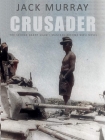El Alamein, Jack Murray [best autobiographies to read .txt] 📗

- Author: Jack Murray
Book online «El Alamein, Jack Murray [best autobiographies to read .txt] 📗». Author Jack Murray
Manfred listened to the barrage in silence. Light flickered on the faces of his fellow crew like they were watching a film at the cinema. It wasn’t fear they were experiencing at that moment; they were all too numbed by cold and hunger. Nor was it resignation, for despite everything, there was still a flicker of hope that they could win. Rather it was the sense of living in a dream. The noise and the pyrotechnics of what had been unleashed by the Allies was hypnotic and horribly beautiful. But the initial awe gave way, once more, to realisation that soon they would all be in the middle of this storm. Manfred and the others trembled in the cold of the night and waited. It was not shelling they had to fear but the silence that followed. That’s when the enemy would come. That’s when the fighting would start.
39
Ladenburg, Germany, 23rd October 1942
The first rumble of thunder came as Peter Brehme waited for Keller to emerge from the station. The Gestapo man loped over towards him like a Labrador about to go for a walk. His face split with a triumphant grin. It seemed like he was about to burst into song. He took his hands from his pocket and handed a piece of paper to Brehme.
‘These are the homes we are going to visit.’
Visit? Brehme could have laughed. As it happened, he already knew the list. Keller couldn’t know this of course. Brehme studied the list with a frown. He was no actor, but he did a nice line in impassivity and neutrality when he had to.
‘Becker?’ he exclaimed but not too dismissively. He turned his eyes towards Keller in disbelief. ‘They are an old couple. Are you really telling me they are harbouring Jews?’
Keller nodded exultantly.
‘What proof do you have?’ pressed Brehme. It would look odd if he, at least, didn’t demand this. In truth, he just wanted it all over with. The rain was getting heavier now and the ink on the paper was running. The two men started to move towards Brehme’s police car.
‘Do you want to come with me?’ asked Brehme.
‘Yes,’ replied Keller starting to trot, his shoes splashing on the pavement.
They reached the car and climbed in. Just as he was about to start the motor, Brehme saw Graf running towards them. He nearly slipped on the wet road. Around him the other police cars and military vehicles were departing.
Graf fell into the back seat and apologised. Brehme felt like shaking his head but decided not to humiliate the policeman in front of Keller. He started the engine and soon they were off.
‘I want to go to Becker’s house. If I’m wrong, I’m wrong. I need to see with my own eyes, Ernst. This is extraordinary.’
‘I quite understand. To answer your question, we have testimony from Herr Weber at the grocery store that Becker and some of the others on that list are buying unusually large quantities of food.’
‘They have a dog,’ pointed out Brehme. It sounded weak, even to him. The Gestapo man laughed sardonically.
‘This dog obviously likes potatoes,’ replied Keller. He made little attempt to hide his contempt.
The first flashes of lightning were now visible, and the thunder crashed more loudly. It felt like a portent. But for who? Brehme felt his chest tighten. The Jewish families had all been spirited away to the Kramer farm. Robert Sauer, a mere schoolboy, had confirmed that they would be moved within twenty-four hours. How he knew, Brehme did not inquire.
The rain was falling very heavily now, the wipers fighting a losing battle against its intensity. Behind him was another car. At least eight policemen and Gestapo would overpower an elderly couple. It was almost laughable, yet his insides were churning. If they found some sign that there had been other people in the house, then it was all over. They wouldn’t take long to break the Beckers. They knew nothing of Kramer. but Robert Sauer did. And so did he. They would be questioned and slowly the whole house of cards would crumble.
The Becker house was up ahead. He could see the lights on in the front room. Perhaps they would be sitting down to their evening meal, able to relax for perhaps the first time in over a year. Except they knew there would be visitors. Brehme wondered how they would react. So much depended on them.
The car pulled to a stop and they got out. Keller silently ordered the other policemen around the back of the house. A few people on the street had seen what was happening and were milling towards them.
Brehme and Graf followed the Gestapo man to the front door. Keller was about to batter the front door with the heel of his fist when Breme held a hand up. Inside a dog began to bark.
‘Let me,’ he said and stepped forward in front of Keller. He knocked on the door. It wasn’t a loud knock and Keller was visibly irritated at having this part of his show ruined. He’d wanted noise and fear. In its place was polite restraint. He was about to take over proceedings when he heard the door being unlatched then opened.
Otto Becker stood there staring stupidly at Brehme and then Keller. It was quite a performance, thought Brehme. He really looked like he had no idea of what was going on.
‘Herr Brehme,’ said Becker after a few moments, ‘but what are you doing here?’ He didn’t need to add, ‘with all these policemen’? That was evident from the glance he shot Keller and Graf. Felix the Labrador had come to see what was going on. His tail was wagging in a welcoming manner. He started to bark.
‘Shush, Felix,’ said Becker.
‘Herr Becker, we have reason to





Comments (0)